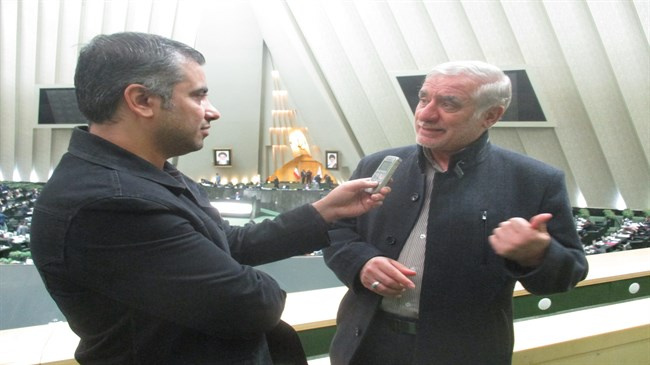MP: Trump failed to get concessions from Iran by JCPOA withdrawal

President Donald Trump sought to obtain concessions from Iran by pulling the US out of the Joint Comprehensive Plan of Action (JCPOA), but he failed, said an Iranian lawmaker.
In May 2018, Trump withdrew the US from the JCPOA, signed between Iran and the P5+1 in July 2015, and reimposed Washington’s unilateral sanctions on Tehran in two phases.
Iran, however, stood resolutely against the Trump administration and its move, added Mohammad-Javad Jamali-Nobandegani, the secretary of the Iranian Parliament's National Security and Foreign Policy Committee, in an exclusive interview with Iran Daily.
Given that the date of the next presidential election in the US is approaching, Trump does not have much time to achieve his goals regarding Iran, he noted.
Turning to the Trump administration’s negotiation proposal, he expressed satisfaction with the fact that this time, there is a national consensus in Iran over the fact that under the present circumstances, holding negotiations with Trump is not acceptable at all.
This was unanimously announced by the Leader of the Islamic Revolution Ayatollah Seyyed Ali Khamenei, Iranian President Hassan Rouhani, Iranian Parliament and all the political parties of the country, the lawmaker said.
Commenting on Trump’s present situation in the US, he said, “We see that differences over Trump have significantly increased recently. Members of the House of Representatives and, even, Republican senators have called for impeaching him.”
On the other hand, he added, Trump’s insane behavior, shown to intimidate his rivals, failed to produce favorable results about Iran.
“Even North Korea has abandoned talks with the US and does not show the same fear it used to have about Trump’s behavior.”
Given the current situation of the US administration, the likes of John Bolton – the US national security advisor – would leave the country’s political scene in a few months, he predicted.
Washington has reached a dead end over the issue of Iran and is showing a paradoxical behavior, the MP said, adding the US is definitely seeking to enter into negotiations with Iran, but Tehran is not willing to hold talks under the status quo.
If Iran acquiesces to negotiations with the US under the current circumstances, Washington will presume that its pressures on Tehran have produced favorable results.
“We do not nix negotiation as we held talks with the US and the West over the issue of the JCPOA. However, if we are to enter into negotiations, they have to be conducted in an equal and rational situation.”
Elaborating on it, he said firstly, the US is required to return to the JCPOA as the country, itself, had signed the agreement and acknowledged that the deal was an appropriate framework for holding talks and resolving issues surrounding Iran’s peaceful nuclear program.
Commenting on the flexibility demonstrated by Iran regarding the JCPOA, he said, “To sign the deal, we gave up some of our rights, such as enriching uranium to 20 percent, and accepting limitations on our heavy water production. These were all among the rights we relinquished in favor of holding negotiations.”
All these measures were taken in an effort to create a positive atmosphere called the JCPOA, he said, regretting that Trump, with his unilateral move, set the JCPOA and the spirit of the deal on fire.
The West never imagined that Iran would be able to enrich uranium to 20 percent, the lawmaker noted.
When the news of Iran’s 20-percent uranium enrichment was spread, BBC and many other media described it as a ‘political bluff’, Jamali-Nobandegani added.
However, when it was confirmed, Western states, including the US, hurried to hold talks with Iran, he recalled.
“The situation is the same at present.”
He added Iran has announced that in a few days, it will raise the level of its uranium enrichment and will not accept any limitations on selling its heavy water.
Shifting to the US expanded presence and escalation of tensions in the Middle East, he said instead of thinking about ensuring regional security, the Trump administration is solely pursuing a trade diplomacy in the region.
In addition, the US is also seeking to ensure Israel’s stability and maintains that Iran is preventing it from achieving this goal, Jamali-Nobandegani added.
The lawmaker also touched upon Saudi Arabia’s regional policies, opining that Riyadh seeks to become the Arab world’s leader on one hand, and push Iran toward a military conflict with the US on the other in a bid to have the upper hand in the region.

